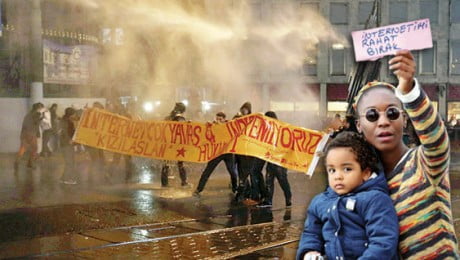Keyword: Democracy

Erdoğan gov’t abusing regulatory agencies to punish opponents
Pressuring state regulators to abuse their powers, the ruling Justice and Development Party (AK Party) government has mounted an aggressive campaign to punish groups and companies that are critical of the government’s handling of a massive corruption investigation, which has led to questions about the credibility and independence of regulatory agencies in Turkey.

Turkish PM heads to Brussels for tough talks with EU
Although the prime minister argues that an ongoing corruption and graft probe engulfing his own ministers is simply a plot hatched by an “illegal gang” that he describes as “parallel state” operated by Fethullah Gülen, a cleric in self-exile in the U.S., EU officials have made clear that such rhetoric has not been bought in Brussels.

Neither Erdoğan nor EU the same after five years
Erdoğan is going to Brussels as the prime minister of Turkey who doesn’t even have ambassadors in three of its region’s important capital; Cairo, Tel Aviv and Damascus. A negotiation chapter was opened in November 2013 after a three-year freeze. Erdoğan had to sack the former EU minister from the cabinet because of the allegations in relation with a major graft probe in December 2013 and appointed Mevlüt Çavuşoğlu to that post.

This is too much! [About the Lies and Slanders directed to Gulen movement]
Prime minister said during the fourth ordinary general meeting of the Turkish Confederation of Businessmen and Industrialists (TUSKON) in March of 2012:
“You are not backed by dark forces. You are not backed by the mafia, gangs, junta regimes. You are not backed by the bankers in Galata. You did not take advantage of the sources of the Treasury or public banks. You did not act according to an ideology. You did not surrender to the pressures and roadblocks. You only trusted in the people. Because you only relied on people, you are great and make this country great.”

Main opposition brings plans to sink Bank Asya to Parliament
The main opposition Republican People’s Party (CHP) has brought onto Parliament’s agenda claims that some state companies and institutions withdrew massive amounts of money from participation bank Bank Asya in order to push it into insolvency by choking its liquidity conditions.

You cannot fool all the people all the time
In a panic to save its future, the Erdoğan government calling it a “parallel state,” an “illegal organization,” a “criminal gang,” a “web of treason” and “raving Hashashins” is attempting to collectively punish the Hizmet movement, whose establishments have significantly contributed to the betterment of the country in the fields of education, business, democratization, social solidarity and international relations.

Turkish authorities purge regulators, state TV employees in backlash against graft probe
Turkey has extended a purge of official organizations to the banking and telecommunications regulators and state television, firing dozens of executives in moves that appear to broaden Prime Minister Recep Tayyip Erdogan’s push back against a corruption investigation.

Reassignments — new mobbing on massive scale by gov’t to silence dissent
According to commentators, the governing Justice and Development Party (AK Party), through these reassignments, is not only putting pressure on those carrying out the graft probes but also sending a message to its critics in state positions that their fate will be no different from that of their reassigned colleagues if they do not desist from their criticism of the government.

Opposition leader Destici: Since when has exposing graft been a crime?
Allegations previously dismissed by judicial authorities are being raised again. People in the bureaucracy are being profiled. Officers have been removed from their posts in some ministries. Furthermore, mayoral elections are scheduled for March, and campaigning is becoming tenser.

Dumanlı: Accusations directed at Hizmet Movement is a great disappointment
Dumanlı reminded that the government deems Hizmet Movement as an illegal group but until recently the government has had close relationships with the Hizmet. “Did not you want to meet with Gülen in May? And did not you send Bülent Arınç when the meeting did not take place?

‘Mission impossible’ for Turkey’s ambassadors
Erdogan has placed an extremely heavy burden on Turkey’s ambassadors. The same ambassadors for many years have been under instructions to promote the schools and activities of the Gulen movement as Turkey’s “biggest and most effective lobbying operation” and to support them.





















